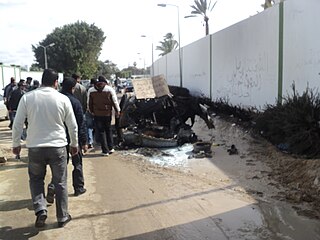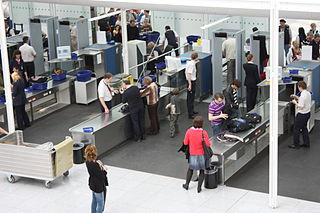
Panama, officially the Republic of Panama, is a country in Latin America at the southern end of Central America, bordering South America. It is bordered by Costa Rica to the west, Colombia to the southeast, the Caribbean Sea to the north, and the Pacific Ocean to the south. Its capital and largest city is Panama City, whose metropolitan area is home to nearly half of the country's over 4 million inhabitants.

A United Nations Security Council resolution (UNSCR) is a United Nations resolution adopted by the Security Council (UNSC), the United Nations (UN) 15-member body charged with "primary responsibility for the maintenance of international peace and security".

The United States invaded Panama in mid-December 1989 during the presidency of George H. W. Bush. The purpose of the invasion was to depose the de facto ruler of Panama, General Manuel Noriega, who was wanted by U.S. authorities for racketeering and drug trafficking. The operation, codenamed Operation Just Cause, concluded in late January 1990 with the surrender of Noriega. The Panama Defense Forces (PDF) were dissolved, and President-elect Guillermo Endara was sworn into office.

The Torrijos–Carter Treaties are two treaties signed by the United States and Panama in Washington, D.C., on September 7, 1977, which superseded the Hay–Bunau-Varilla Treaty of 1903. The treaties guaranteed that Panama would gain control of the Panama Canal after 1999, ending the control of the canal that the U.S. had exercised since 1903. The treaties are named after the two signatories, U.S. President Jimmy Carter and the Commander of Panama's National Guard, General Omar Torrijos.

A United Nations resolution is a formal text adopted by a United Nations (UN) body. Although any UN body can issue resolutions, in practice most resolutions are issued by the Security Council or the General Assembly, in the form of United Nations Security Council resolutions and United Nations General Assembly resolutions, respectively.

United Nations Security Council Resolution 1680, adopted on May 17, 2006, after recalling previous resolutions on Lebanon, including 425 (1978), 426 (1978), 520 (1982), 1559 (2004) and 1655 (2005), the Council strongly encouraged Syria to respond positively to Lebanon's request to delineate borders and establish diplomatic relations, with the purpose of asserting Lebanon's sovereignty, territorial integrity and political independence.

United Nations Security Council Resolution 325, adopted on January 26, 1973, after acknowledging the government of Panama's offer do what ever was necessary to host the Council and the Latin American Group's support for this idea, the Council decided to hold meetings at Panama City from March 12 to March 21, 1973. The agenda for these meetings was to be "Consideration of measures for the maintenance and strengthening of international peace and security in Latin America in conformity with the provisions and principles of the Charter". The Council requested the Secretary-General enter into negotiations with the Panamanian government to conclude an appropriate conference agreement.

The first emergency special session of the United Nations General Assembly was convened on 1 November and ended on 10 November 1956 resolving the Suez Crisis by creating the United Nations Emergency Force (UNEF) to provide an international presence between the belligerents in the canal zone. The First Emergency Special Session was convened due to the failure of the Security Council to resolve the instability at the Suez Canal. This forced an invocation of the "Uniting for Peace" resolution, which transferred the issue from the Security Council to the General Assembly in its Emergency Special Session (ESS) guise. On the fourth day of the ESS the Canadian representative, Lester B. Pearson, introduced the concept of a UN police force. The creation of the United Nations Emergency Force was approved by the General Assembly with 57 supports and zero opposes. The vote had 19 countries abstaining, including the United Kingdom, France, Egypt, the Soviet Union and several Eastern European countries.

United Nations Security Council resolution 1540 was adopted unanimously on 28 April 2004 regarding the non-proliferation of weapons of mass destruction. The resolution establishes the obligations under Chapter VII of the United Nations Charter for all member states to develop and enforce appropriate legal and regulatory measures against the proliferation of chemical, biological, radiological, and nuclear weapons and their means of delivery, in particular, to prevent the spread of weapons of mass destruction to non-state actors.
Panama is a transcontinental country spanning the southern part of North America and the northern part of South America.

United Nations Security Council Resolution 1874 was adopted unanimously by the United Nations Security Council on 12 June 2009. The resolution, passed under Chapter VII, Article 41, of the UN Charter, imposes further economic and commercial sanctions on the Democratic People's Republic of Korea and encourages UN member states to search North Korean cargo, in the aftermath of an underground nuclear test conducted on 25 May 2009.

In United Nations Security Council resolution 984, adopted unanimously on 11 April 1995, the council gave assurances to non-nuclear weapon states that were parties to the Nuclear Non-Proliferation Treaty (NPT) against the threat of nuclear proliferation.

United Nations Security Council resolution 1189 was adopted unanimously on 13 August 1998. In the resolution, after expressing its deep disturbance at the bombings in Nairobi, Kenya, and Dar es Salaam, Tanzania, on 7 August 1998, the Council strongly condemned the terrorist attacks and called on countries to adopt measures to prevent further incidents.

United Nations Security Council resolution 1199, adopted on 23 September 1998, after recalling Resolution 1160 (1998), the Council demanded that the Albanian and Yugoslav parties in Kosovo end hostilities and observe a ceasefire.
United Nations Security Council resolution 1390, adopted unanimously on 16 January 2002, after recalling resolutions 1267 (1999), 1333 (2000), 1363 (2001), 1368 (2001), 1373 (2001) 1378 (2001) and 1383 (2001) concerning the situation in Afghanistan and terrorism, the Council imposed further sanctions on Osama bin Laden, Al-Qaeda, the Taliban and others associated with them.

United Nations Security Council resolution 1435, adopted on 24 September 2002, after recalling resolutions 242 (1967), 338 (1973), 1397 (2002), 1402 (2002) and 1403 (2002), the Council demanded the end to Israeli measures in Ramallah, including the destruction of Palestinian infrastructure.

United Nations Security Council Resolution 1970 was a measure adopted unanimously by the UN Security Council on 26 February 2011. It condemned the use of lethal force by the government of Muammar Gaddafi against protesters participating in the Libyan Civil War, and imposed a series of international sanctions in response.

United Nations Security Council resolution 1624, adopted unanimously at the 2005 World Summit on 14 September 2005, after reaffirming previous resolutions on terrorism, including resolutions 1267 (1999), 1373 (2001), 1535 (2004), 1540 (2004), 1566 (2004) and 1617 (2005), the Council called on all states to co-operate in order to strengthen the security of their international borders by enhancing terrorist screening and passenger security procedures.















